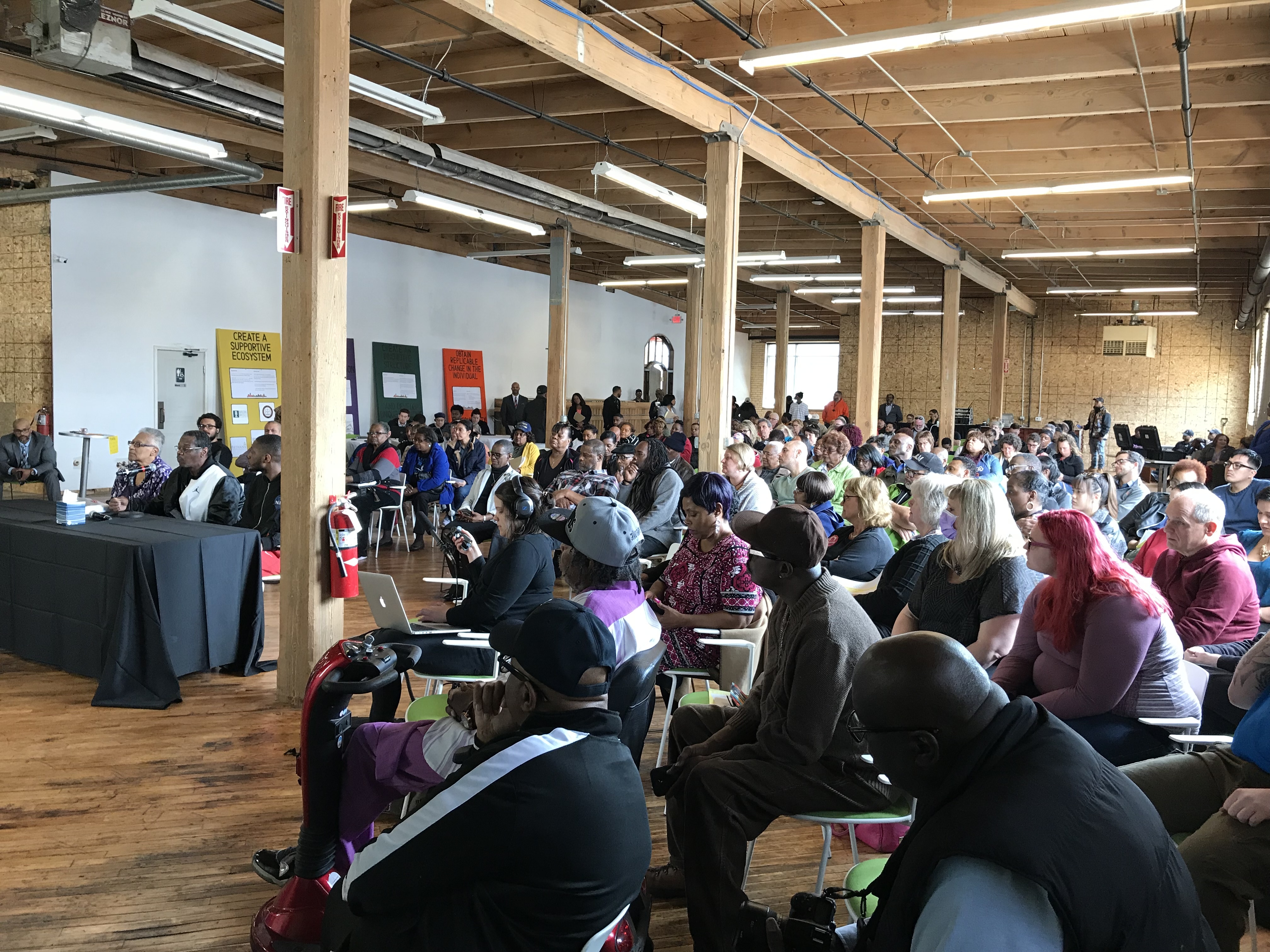Thursday afternoon, less than three miles south of a rally for President Trump — whom Attorney General Dana Nessel reportedly said this week is a “huge factor” in hate crimes rising in Michigan — dozens of Grand Rapids residents gave heartfelt and at times harrowing testimony about their encounters with the Grand Rapids Police Department.
The Michigan Department of Civil Rights had organized an all-day hearing “fairly fast” on Thursday in response to recent incidents between the GRPD and community members, said MDCR Executive Director Agustin Arbulu. GRPD has also faced criticism over its work with Immigrations and Customs Enforcement and detaining residents.
Over the past two weeks, GRPD officers have encountered new criticism over detaining two teenage Latino suspects at gunpoint, as well as arresting an African American man after pepper spraying and punching him roughly 30 times. Arbulu said the events come as “seven or eight” other formal complaints against GRPD are pending with the state department.
For more than three hours Thursday afternoon, four MDCR employees listened to testimony from 39 residents, more than two-thirds of whom were African American. One person spoke in support of GRPD. Another three-hour listening session was scheduled for Thursday evening.
The MDCR is collecting testimony before deciding whether to file a formal complaint against the police department over “entrenched discrimination,” Arbulu said, which would then be turned over to neutral investigators. A potential complaint hinges on whether GRPD has violated the state Elliott-Larsen Civil Rights Act.
“The stories and narratives provided were very moving,” Arbulu said after the first round of testimony. He added that the department has taken lessons from the Flint water crisis and wants to hear from concerned, “marginalized voices who feel the system doesn’t work for them.”
By the end of the first session, some patterns emerged from speakers’ encounters with GRPD:
• Officers routinely stop or “pick up” people of color based on alleged criminal activity the police had been notified about — that they “looked like someone.” Several residents said this is simply cover for targeting minorities.
• Several speakers said they were arrested by GRPD for “disrespecting” an officer.
• Residents suspect video evidence from dash cams or body cams is tampered with, or have been told that video footage is lost during the course of a criminal proceeding.
• An unfair playing field exists for white residents compared to African Americans and Latinos. “Why aren’t white kids being held at gunpoint?” one speaker asked.
• The problems with GRPD indicate systemic racism throughout the city and the region, with multiple speakers calling for investigations into other city and county law enforcement.
• Ongoing reports of officer misconduct are creating a sense of helplessness among minorities and a deepening mistrust of law enforcement.
• For those who recently moved here, Grand Rapids is an outlier when it comes to police-community relations compared to other major cities.
While some speakers who have lived in the city for decades questioned whether the state’s actions would make any difference (as past leaders have sought and failed to address the issue), others felt Thursday’s hearing could be a turning point.
“This is a very monumental moment,” said Cle Jackson, president of the Greater Grand Rapids NAACP. He, too, cited the recent incidents in the city.
“This stuff is historical — it didn’t just happen last week, or a year ago. It’s been happening in this community, this world-class progressive city, for decades and decades and decades,” Jackson said. “It’s time to stop it. It’s time to hold local law enforcement accountable for the tragedy and trauma they have caused many people in this city.”
Some speakers held back tears as they recounted incidents with GRPD publicly for the first time.
Others were exhausted by what they described as a decades-long problem. This included Janet Howard, a community activist who has served on the city’s Human Trafficking Work Group.
“You know what they’re saying in the community? We’re tired,” Howard said. “Every time you kick a dog long enough, it’s going to bite back.”
Elaine Lewis, a West Michigan legal fellow with the American Civil Liberties Union of Michigan, was the first to speak Thursday. She moved to Grand Rapids’ Heritage Hill neighborhood in 2017.
Since then, Lewis — who is African American — described two incidents in which both she and a friend were followed by a GRPD cruiser in her neighborhood.
“I had heard Grand Rapids was a wonderful place to live. Unfortunately, my experiences with the Grand Rapids Police Department have made me feel unsafe,” Lewis said. “I now explain that Grand Rapids is a great place to live, but it’s less great if you’re not white.”





